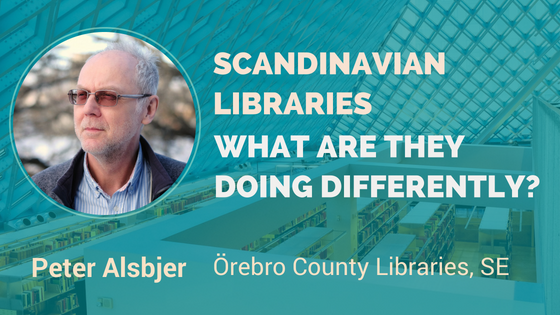Libraries worldwide are facing budget cuts and a decline in usage but Scandinavian libraries are fighting this trend. As the upcoming opening of Helsinki’s state-of-the-art Oodi Library has reached the news, Scandinavian Libraries are again in the spotlight.
To find out the reasons why Scandinavian Libraries are so successful, we’ve had a chat with Peter Alsbjer, Regional Library Director at Örebro County Libraries in Sweden. Check out his thoughts below!
What is the single most important element to ensure the future success of #libraries? Take the #poll at the end of the page and let us know what you think. Click To Tweet1. Can you tell us a bit about yourself and your work with public libraries?
I am the Regional Library Director at Örebro County, situated between the Swedish capital Stockholm and the Norwegian capital Oslo. I recently realized that I’ve been working in the public library area for five decades.
I started working in the music department of the library of my hometown Karlskoga when I was 17. Since then, I’ve been focusing on library extension work and mobile libraries and I’ve also been Library Director at different local libraries.
However, most of my career has been focused on regional library development, i.e. regional library infrastructure, further education for library staff and projects together with local libraries. When the Library 2.0 movement began 10 years ago, I embraced it with great enthusiasm and started my blog – Peter Alsbjers blogg – to inform others what the fuss was all about. Nowadays, the blog has 100-150 daily visitors from all over the world, but most visitors are from the Scandinavian countries.
2. We’ve noticed that libraries worldwide are facing budget cuts and a decline in usage but surprisingly Scandinavian libraries are fighting this trend. What is the secret?
I believe that you can find the answer in the rise of the Scandinavian model for welfare and the development into modern welfare states. This also has something to do with the popular movements from the beginning of the 20th century; the worker’s movement, evangelical movements and the temperance movement. They all started local libraries of their own for the supporters of the movements’ ideas.
Scandinavian #libraries have also played a key role in local non-formal mass education so they have big support from their local communities. Click To TweetScandinavian libraries have also played a key role in local non-formal mass education so they have big support from their local communities. Eventually, these movement libraries have joined together with subscription libraries which turned into public libraries of the modern age. The result is that there is a public library in almost every municipality in the Nordic countries. These libraries welcome everyone and there is no requirement for library users. As segregation increases in all Nordic countries, this arena is becoming increasingly important.
Scandinavian #libraries welcome everyone and there is no requirement for library users. Click To TweetBut of course, even the Scandinavian libraries had their cutbacks as well. In Sweden, more than 500 local libraries, most of them in rural areas, have been closed since the 90’s and in Denmark half of the library branches have closed down since the 80’s.
Dokk1 kåret i nat som verdens bedste nye bibliotek:https://t.co/o7TsKqqCzy pic.twitter.com/JYjeREpi7l
— Dokk1 (@Dokk1Aarhus) August 16, 2016
3. How did Scandinavian libraries cope with these changes?
There are two major trends in library management and planning to cope with the closing of libraries in Scandinavia. The first trend is using volunteers to keep the libraries open, especially in rural areas. Volunteers are also used in libraries when it comes to serving the public with the help of computers and smartphones, helping kids with their homework and refugees with language education.
Trends in Scandinavian #libraries: using volunteers to keep the libraries open and having the #library open for a longer period of time. #openlibrary #librarians Click To TweetThe other trend is having the library remain open for their users after the staff has left the library for the day. In a way, this is giving back the library setting to the library owners – trusting the public in the local area.
4. What should libraries worldwide learn from the Scandinavian model?
I guess that having a mindset with a focus on libraries being a place for teaching literacy in an all digitized world and using the physical library with different kinds of media in combination with the skills of the staff can be a start. And of course, the focus on children and underprivileged parts of the society.
Have a mindset with a focus on #libraries being a place for teaching #literacy in an all digitized world and use the physical #library with different kinds of #media in combination with the skills of the staff. Click To TweetEarlier this year, the board members of the Nordic National Library Associations made a joint presentation on the importance of the modern library for society and democracy at the Nordic Cultural Political Summit. They identified three areas where the inherent strength of libraries can contribute to open, innovative and sustainable societies:
1. Emphasize the role of libraries as a democratic arena with free access to information, source criticism and guidance by trained librarians.
2. Libraries are a resource in terms of digital skills and development. A well-balanced copyright is important for both participation and artistic creation.
3. The library is an open space where everyone can meet and participate. Reading is a vital resource for language development, participation, and integration.
You can read more in English here.
Terrific @guardiancities piece on Finland’s well-funded, well-designed and much-loved public libraries – including Oodi, Helsinki’s soon-to-open new central library https://t.co/fKLrizsoNX pic.twitter.com/Qlw9PpiCod
— Gareth Potts (@newbarnraising) May 16, 2018
5. There are a lot of people saying that libraries are facing an identity crisis. Do you agree? What do libraries need to do to overcome this crisis?
As long as the stereotypes of what a library is, and what a librarian can do, is the main narrative and what a librarian actually does is not clear and the boundary for the “library” is not set – there is an identity crisis. Especially for those who know exactly what a public library is.
For me, I have been musing on what the core of librarianship is. I have concluded that the euphemism for librarianship is rather an onion, rather than, say, a peach. What if there isn’t a single hard core, what if it’s all about layers? Or are libraries passion fruits?
Library staff, professional, non-professional as well as staff with totally different skills and experiences need time for more professional conversations on librarianship and how to become “radical change agents in their local societies”.
#Library staff, professional, non-professional as well as staff with totally different skills and experiences need time for more professional conversations on librarianship and how to become radical change agents in their local societies. Click To TweetThe Library Identity Crisis is what happens in the transition from libraries focusing on collections and transactions (lending books and so on) to libraries focusing on building relationships with library users as well as empowering the community itself by building relationships with the civil society.
The Library Identity Crisis is what happens in the transition from #libraries focusing on collections and transactions to libraries focusing on building relationships with #library users. #librarians Click To TweetThis transition changes the roles, scopes, and purposes of librarianship in a fundamental way. For some people, this could be terrifying. But, this is a question of “do or die” for libraries if they want to be of interest to the public in the future.
In case you want to find out more about the topic, you can get in touch with Peter on Twitter here or follow his blog here. We will be back next week with another interesting article!
Recent posts
The Future of Libraries: Navigating Digital Transformations
In this week's Princh Library Blog post, guest writer Jill Brooks discusses how libraries can navigate their digital transformation, including some of [...]
Library Spaces & Clean Air: The Impact of Printing Choices on Indoor Environment
In this week's Princh Library Blog, guest writer Nina Grant talks about something that's always present, but rarely thought about; air, or [...]




[…] Idag är jag intervjuad på internationella biblioteksbloggen hos Princh! […]
[…] the interview with Peter Alsbjer on Scandinavian libraries and what they’re doing differently on […]